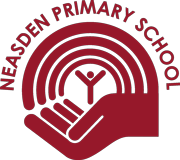Our Approach to Neasden
Neasden Primary school believes that reading is central to a child’s understanding of the school curriculum and is of vital importance in life. Fluent readers can access a full range of life experiences and can enjoy an amazing breadth of genres and writers.
At Neasden, we aim to develop a love and appreciation of reading which will stay with children for life. We hope to achieve this through careful planning and teaching using up-to-date strategies. We aim to use good reading materials and resources within Literacy lessons and Guided Reading sessions and to provide a breadth and range of reading material in school.
Aims
It is our aim to allow children the opportunity:
The classroom environment
Each classroom has a dedicated reading area which includes a variety of class books (Fiction and non-Fiction) which the children can choose and read for pleasure. These appeal to different genders and also reluctant readers. A selection of banded books are also available in each class for use during independent reading.
The teaching of reading
There are two distinct but related processes involved in teaching children to read: learning to read words and developing language comprehension. Both are essential for learning to read.
Developing word recognition and language comprehension skills
In the Foundation Stage and KS1 the priority is given to securing the development of word recognition skills
Children are taught:
Phonics
Progression in phonics skills and knowledge are taught following the Read Write Inc. programme.
All children in the Foundation Stage and KS1, receive a discrete phonics session every day. The children are taught in phonic stages across the Foundation Stage and KS1. The children’s progress is regularly assessed and they move through the phases at their own pace.
Children who have yet to crack the phonetic code but have moved into KS2, have daily phonics intervention, following the Read Write Inc. programme.
Reading routines in Key Stage 1 & 2.
Book Club.
Book Club embraces the principles of Shared Reading is where the teacher works with the children to model fluent, expressive reading, the use of effective reading strategies and to encourage response to texts. It can be a vehicle for both teaching children to read (decode) and for teaching children about reading, including comprehension.
Shared Reading enables children to access and enjoy rich, authentic texts which are slightly beyond their independent reading level. Sessions are generally planned in a sequence and involve re-reading for different purposes, with children using their developing skills and understanding as they become more familiar with the text.
Resources used for Shared Reading include fiction, poetry and non-fiction texts. The text is enlarged to enable all children to see as well as to hear the text. This may be through the use of Big Books, ICT texts or interactive white boards (IWB).
